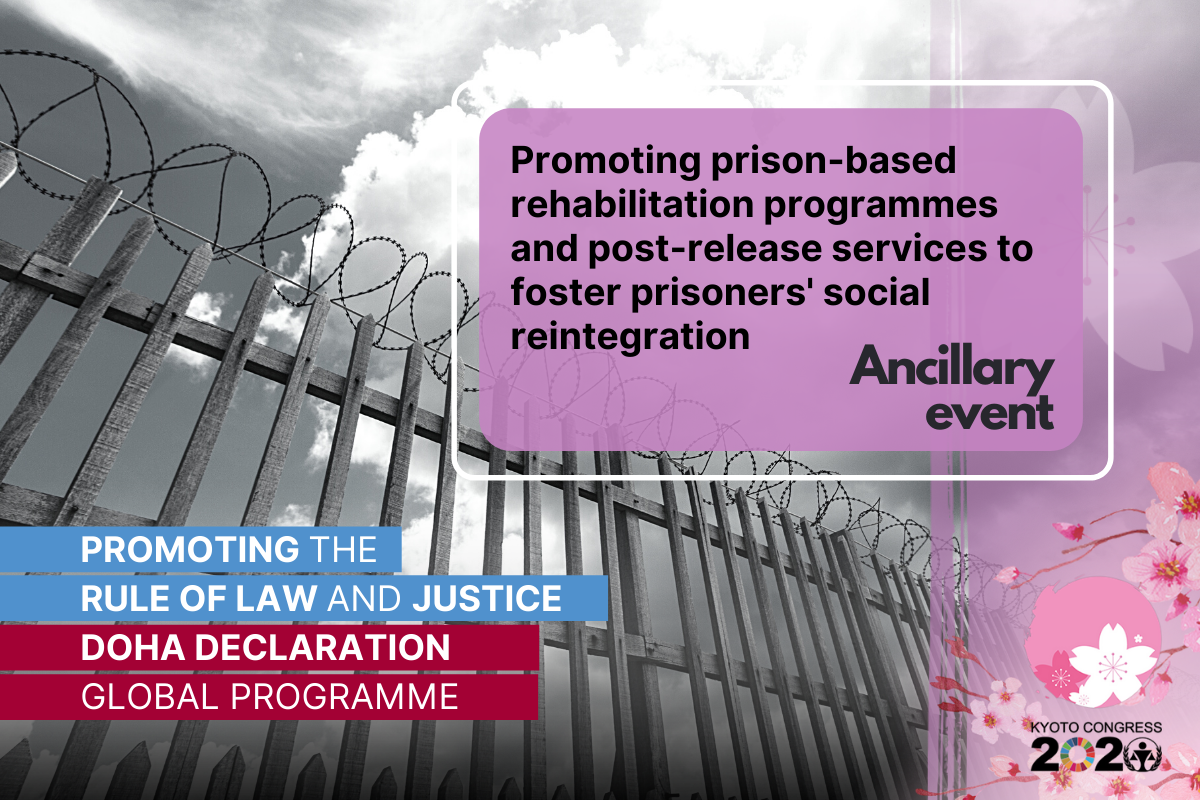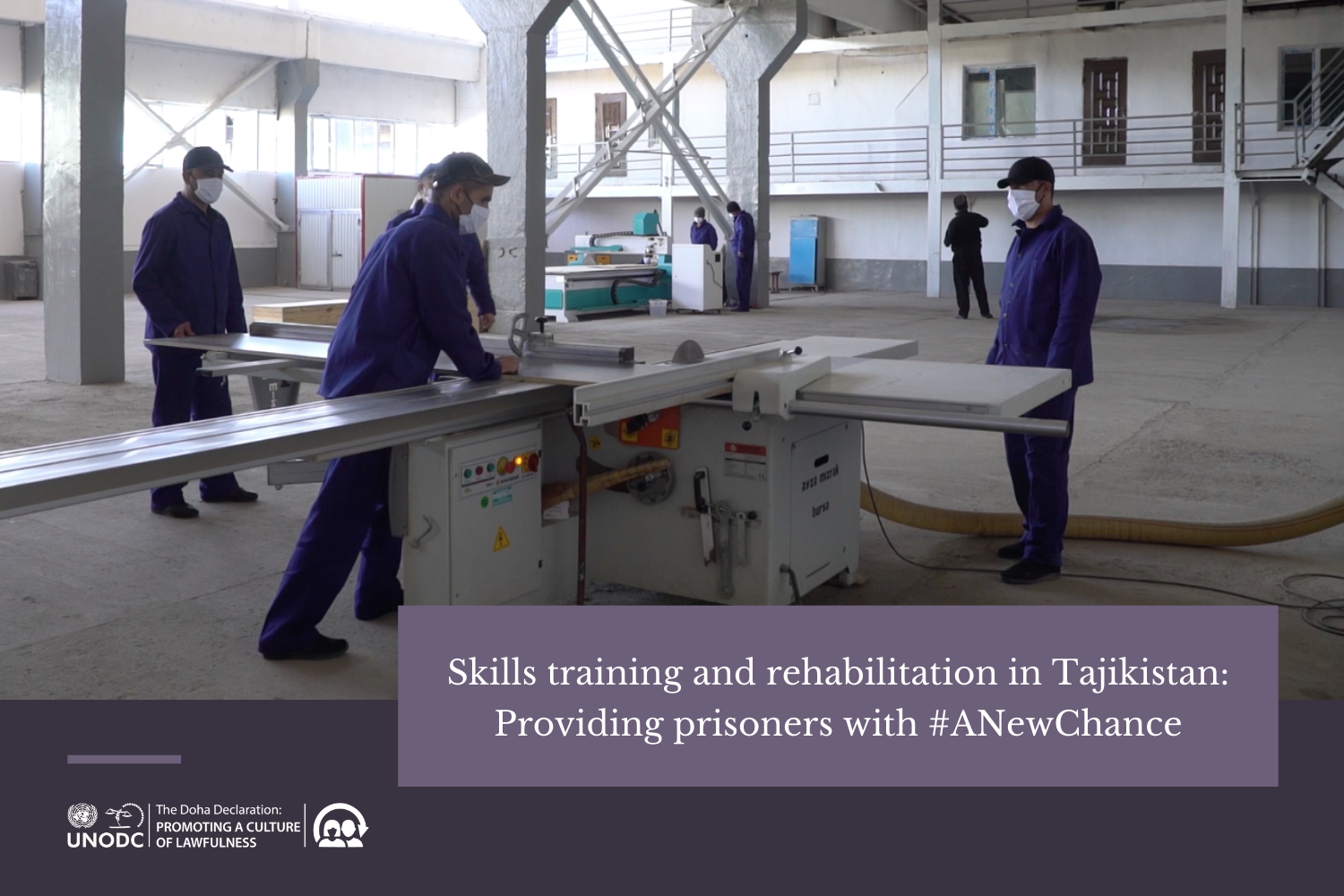Teaching prisoners practical work skills for a new chance in life
19 March 2019 - "All prisoners shall be treated with the respect due to their inherent dignity and value as human beings," states the first of the Basic Principles of the Nelson Mandela Rules (the United Nations Standard Minimum Rules for the Treatment of Prisoners), of which UNODC is the guardian. But to contribute to a more lawful and peaceful world, the raison d' ê tre of the Global Programme for the Implementation of the Doha Declaration, the assurance of dignity during imprisonment may not be sufficient to avoid reoffending and another incarceration. This possibility may increase if, upon release, ex-convicts find themselves in the same circumstances that potentially contributed to their illegal activities in the first place, and to their arrest. That is why it is crucial to think ahead and to prepare prisoners for their reintegration into society.
UNODC's espousal of this psychology has taken it to prison facilities around the world, supporting Member States with a tried and tested method: strengthening prisoners' resolve by teaching them vocational skills which they can practice in work schemes during their sentence, and which can help them find work upon their release. After they have paid their debt to society, the ability of ex-prisoners to find work is undoubtedly a factor which contributes significantly to their dignity and self-reliance, their sense of belonging, and the diminished likelihood of their recidivism.
Tailoring projects to local needs and working closely with prison administrators to gauge the best avenues for rehabilitation in their respective locations, the Global Programme is launching new projects in the State of Palestine, Morocco, Tunisia, Indonesia and El Salvador. They will teach prisoners a variety of useful vocations, and help them improve their self-esteem, decision-making capacities, and confidence in their future. Importantly, these vocations will increase their employability and offer them better work prospects, or better entrepreneurial skills to support them in the case of self-employment. Enabling their smooth transition from incarceration to freedom, prison administrations provide convicts with external certification for their practical training, with documents which do not indicate that the skills were learned in prison.
|
In the State of Palestine, an advanced Technical, Vocation and Educational Training (TVET) programme supported by UNODC will teach and certify male prisoners on electrical installations in Jericho, following a training-of-trainers for prison officers. In addition to training the prisoners and giving them certificates from the Ministry of Labour, the training partners have committed to facilitate work placement for a number of men after their liberation. Given the relatively high level of unemployment in the State of Palestine, currently estimated at around 26 per cent, the promise of job offers will have a positive impact on the overall rehabilitation and social reintegration process.
This training approach to rehabilitation is also being put to good use in Morocco, albeit in a very different sector: the delicate and intricate art of silver jewelry, one of the country's best-known crafts. As part of the programme "Opportunity and Creativity," male prisoners will undergo training in what has become the third most important Moroccan craft in terms of sales. An important objective of this training, for which prisoners with low levels of education and negligible previous work experience will be given priority, is to enhance their chances for successful self-employment following release. At the same time, the project is a first step in the establishment of a silver jewelry manufacturing and marketing facility, employing inmates and generating revenues for them.
Similarly, training in traditional crafts is being implemented with UNODC's support in Indonesia, but with an added twist; female prisoners will participate in a training cycle, provided by Second Chance Foundation, to learn the techniques of traditional batik production (a method of dyeing and decorating fabric with wax and dye which has been practiced for centuries) in an eco-friendly manner, using natural wood barks and leaves as colorants. Even before their release from prison, inmates who have completed the training will be afforded the possibility of working at the production facility, receiving remuneration based on after sales profit.
The protection of the environment is also at the heart of another innovative project about to begin in Tunisia, where UNODC is supporting the recycling of waste and the manufacture of plastic products in the prison of Mornaguia. After the original plastic waste has been gathered in 27 prisons around the country, it will be converted into the adequate raw material which is then transported to Mornaguia for the production of flower pots. This project is particularly relevant when considering the employment prospects of liberated convicts, with more than 300 recycling companies currently operating in Tunisia.
Similar rehabilitation projects have already been supported by UNODC in a variety of fields, including the 'Building Freedom' construction training for female prisoners in Bolivia, assisting Tajikistan to enable the training and employment of male prisoners in metalwork and furniture manufacture, supporting baking, shoe-making and sewing vocational trainings for male and female prisoners in Kyrgyzstan, supporting a multi-purpose vocational training facility and a post-release registration center in Zambia, developing a soap manufacturing and a hydroponics project in Namibia, and giving male and female prisoners in El Salvador access to university studies.
The projects stem from UNODC's Roadmap for the Development of Prison-based Rehabilitation Programmes, released by the Global Programme in December 2017; it is a practical guide which assists prison administrations in developing high-quality and sustainable rehabilitation programmes, and which details the process by which prisoners are prepared for liberation and reintegration. The Roadmap guides Member States on giving prisoners new skills and work experience through constructive activities, in line with international standards and norms.
Additional information:
UNODC's work in p risoner rehabilitation
Roadmap for the Development of Prison-based Rehabilitation Programmes
The Nelson Mandela Rules
UNODC prison tools and publications


